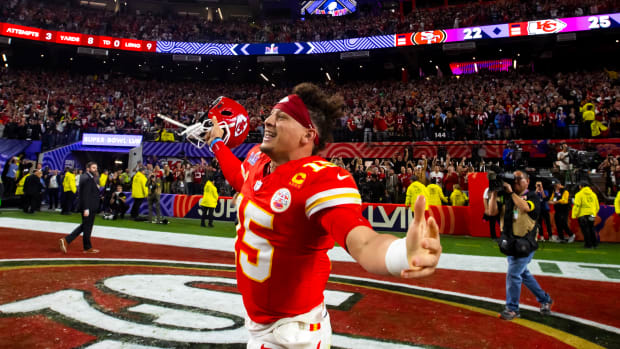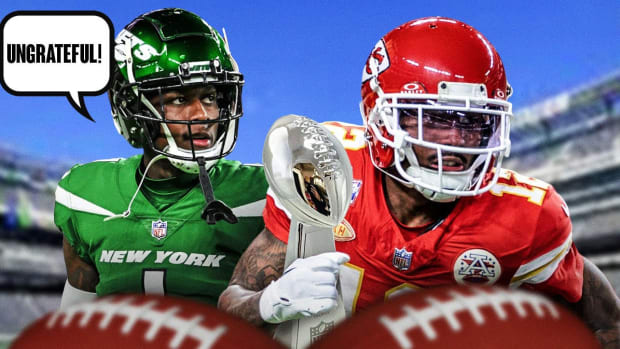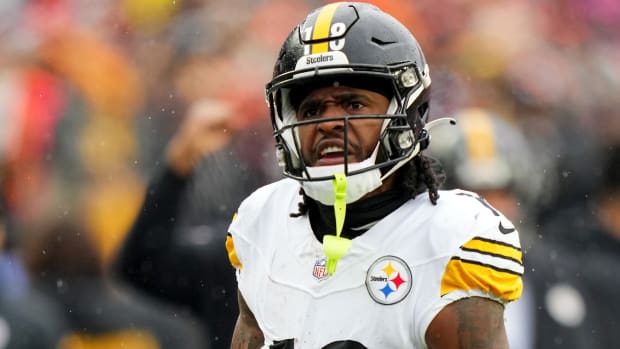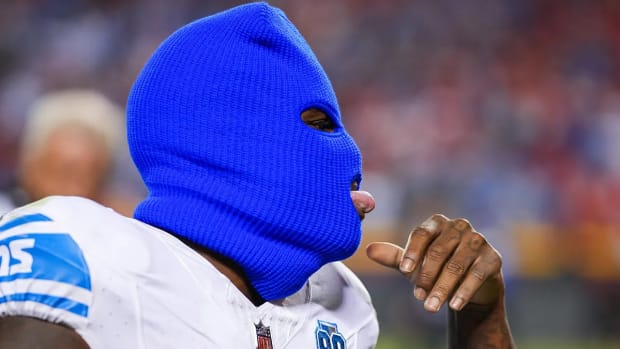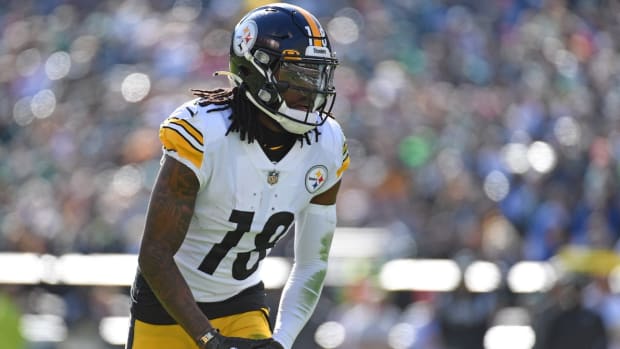Josh McDaniels’ Decision Is Sign That Patriots Future Will Be Guided By New Leadership Core
Bill Belichick isn’t much for NFL rules allowing assistants to pursue head coaching jobs with their seasons still happening, but he adheres to them in his own way. And if those interviews are going to happen, they’re going to happen on Belichick’s terms.
His assistants are told, “Here’s the day, here’s the time.” He insists the interviews happen in close proximity to Gillette Stadium. When they’re over? They’re over.
That should explain how, on Tuesday, Josh McDaniels came into new information that he hadn’t previously been privy. It’s ultimately why he made the decision to leave the Colts at the altar and remain as Patriots offensive coordinator.
I’m not here to apologize for McDaniels. The Colts should be mad. The assistant coaches he left behind should be furious.
But the truth is things changed Tuesday, a day that started with McDaniels driving to Gillette Stadium with the intention of cleaning out his office. Over the course of the day, McDaniels met intermittently with Belichick, owner Robert Kraft and team president Jonathan Kraft, spending the most time with the elder Kraft as McDaniels’ thinking started to shift.
In this week’s GamePlan, we’ll cover all the angles in wrapping up Super Bowl LII—looking at what Eagles czar Howie Roseman got right, how the coaches changed who Nick Foles is as a quarterback, and another reason why Patriots coach Bill Belichick benched Malcolm Butler. We’ll also have franchise-tag nuggets, a proposed rules change for Super Bowl coaches, and a look into the Lions’ new partnership.
We start, though, with the story of the week, and how and why the Patriots were able to court McDaniels back after he was all but signed away to Indy.
The larger question here, of course, is why this didn’t happen before McDaniels took interviews with the Colts, Giants and Bears, or before he decided to go with the Colts, or before he started to assemble his Indianapolis staff. One answer is above—Belichick simply wouldn’t allow it. His insistence on everyone in his football operation focusing on the playoffs put the idea of having such a conversation off limits.
Once McDaniels, Belichick and the Krafts could have that conversation, ownership was able to convey to their offensive coordinator, who’s served as a Patriot assistant for 15 seasons over two stints, how much he means to their organization. And ultimately, adding that sort of personal feeling to the stability he’s had in New England in a very unstable profession was enough to keep him.
Here’s what else I’ve been able to glean over the past 24 hours...
• Sources say there is nothing on paper in regards to a succession plan, and McDaniels was not given a firm timeline on Belichick’s future. That said, I’m going to infer that McDaniels knows where he stands with the organization and what the post-Belichick Era might look like. McDaniels also may have a general idea of how long his boss is sticking around.
• Asked about the idea that Belichick could be on his way out, one Patriots source said that based on the work he’s been doing on the draft and free agency, “He’s certainly not acting like he’s leaving anytime soon.”
• McDaniels’ current deal with the Patriots is up after the 2018 season. My belief is the extension he’s getting now will reflect his desire for stability, more than it will a desire for money—and my sense is it’ll be for four or five years, which is very unusual for an assistant.
The Josh McDaniels U-Turn: Coach Abandons Colts After Patriots Convince Him to Stay
• Nick Caserio’s presence in Foxboro was absolutely a factor in Josh McDaniels’ decision. Not only are the two close—they played together at John Carroll two decades ago—but each has the utmost respect for the job the other does. My belief is there’s a high probability McDaniels would be in San Francisco right now, had the Niners been able to lure Caserio a year ago.
• That should explain how important having the right personnel chief was to McDaniels as he pursued head coaching jobs the past few years, and along those lines, I’m told Colts GM Chris Ballard was the No. 1 reason why the job was so attractive to the Patriots OC. As we’ve reported here, the two built a very solid relationship over the past year, and hold each other in high regard.
• McDaniels’ intention was to take the job, but there were questions he needed answered after the first interview. So the Colts traveled to Massachusetts and met McDaniels at his home on Jan. 26. That was the first time that McDaniels met with owner Jim Irsay. All parties left that meeting on the presumption he’d be the Colts’ next coach, and work on staffing continued.
• Rumors about a change of heart were present over the past few weeks, and the reason why was that McDaniels had grown quiet with assistant coaches who were candidates for jobs in Indianapolis. There were lots of nervous coaches out there, and that’s one reason why rumblings persisted.
• McDaniels was in touch Tuesday night with the three coaches who already had Colts deals in place—defensive coordinator Matt Eberflus, offensive line coach Dave DeGuglielmo, and defensive line coach Mike Phair. Some others who were waiting on him had not heard from him as of Wednesday.
• Was Andrew Luck’s health a factor in McDaniels’ decision? I don’t think it was in a significant way. But when anyone’s making a big decision like this, all factors are taken into account, so I don’t think it was irrelevant either.
OK, so let’s get back to why the Krafts may have had a desire to throw the moon and the stars at McDaniels now, instead of doing it a month ago.
Sunday was a tough day for the franchise. Monday may have been even more difficult. The Malcolm Butler situation was simmering. The Patriots were about to lose Matt Patricia to Detroit, McDaniels to Indianapolis, and it looked like special teams coordinator Joe Judge and assistant quarterbacks coach Jerry Schuplinski would go to the Colts too.
No Signed Contract, No Deal: Legal Fallout for Josh McDaniels and the Colts
Suddenly, the Patriots were dealing not just with a difficult loss, but also a looming rebuild of their coaching staff. The foundation going forward? Before the 2018 season starts, the owner will turn 77, the coach will turn 66, and the quarterback will turn 41, which naturally lands the club in the kind of year-to-year spot that set off friction between Robert Kraft and Bill Parcells more than two decades ago.
A few years ago, Kraft said so himself.
“I was a new owner,” Kraft told USA Today in 2013. “I had a lot of debt. I had stardust in my eyes. I had a Hall of Fame coach. I was green and new. And I don’t think Bill ever dealt with someone like myself. He had a contract that said he’d coach year-to-year. And that didn’t make me feel secure.
“When I bought the team in 1994 … he was coaching year-to-year, making personnel decisions. He used to drive down to Jupiter, Fla., at the end of the year and he’d say he’d decide whether he was coming back to coach. That didn’t inspire confidence in me.”
What was in front of the Kraft family this time around was different in some ways, but very similar in another. It was hard to see, coming out of Super Bowl LII, what was ahead for the Patriots with any sort of clarity.
Today, they should feel a little better about things. Jonathan Kraft is 53 years old, and has a good relationship with the 42-year-old Caserio, who should ascend to GM, the 41-year-old McDaniels, who should become head coach when Belichick walks away.
Evidently, McDaniels felt pretty good about all that, too.
FIRST AND 10
1. I believe Rob Gronkowski’s rumblings about retirement are real. He’s been responsible with his finances (putting away most of his football money and living largely off his endorsement cash), and he’s taken an absolute beating. That this is a real choice for high-profile players now is great progress, too. Give credit to ex-Niner LB Patrick Willis and ex-Lions WR Calvin Johnson credit for blazing that trail.
2. The price of some franchise tags have gotten to the point where they could make it difficult for teams to do long-term deals with their stars. One such case involves Cowboys DE Demarcus Lawrence. Tagging him would cost Dallas around $17 million. That means a second tag would cost between $20 million and $21 million, and put him well within his rights to ask for a new deal averaging $18 million or $19 million per year. So would Dallas rather live in that world or risk losing him by letting him go to market?
3. That also explains why Steelers president Art Rooney was coy in talking to reporters this week about tagging Le’Veon Bell. His tag for 2018 will come in at $14.544 million, which will make getting him motivated to do a long-term deal costly and complicated.
4. Speaking of the tag, Rams CB Trumaine Johnson is a good example of a guy using it the right way. He’s made $30.7 million on two tags, and will hit the market now at 28 years old. That’s how you draw it up.
5. The Broncos’ sights have been set on Kirk Cousins for some time. But if that doesn’t work out, and getting a deal for him under the cap would be challenging, then Case Keenum becomes a name to watch in Denver. You may remember that John Elway tried to trade for him during 2016 season.
Russell Wilson On Being Traded to the Yankees
6. Brad Childress is an awfully solid hire for Matt Nagy in Chicago. Childress was the guy Andy Reid used as a backstop when elevating Nagy to OC in 2016. Childress can do the same for Nagy as he adjusts to being a head coach, and help creatively with the spread concepts that new OC Mark Helfrich will be incorporating.
7. Someone tweeted at me asking if, given the kind of prospect he is, Notre Dame guard Quenton Nelson could kick out to tackle. The answer I got back is that he’s not really that type of player, but if he can prove capable of playing center (which requires smarts and the ability to move off the snap) over the next few months, that would add to his value. And Nelson is a Top 10 pick already.
8. Not for nothing, teams took notice of how Chris Ballard handled himself Wednesday, and it should reverberate with coaching candidates. “Ton of respect for Ballard now,” texted one NFC team president. “Dude handled it well.” I’d second that.
9. Listening to new Titans offensive coordinator Matt LaFleur on Wednesday, and knowing of his work with the Rams last year (in tandem with Sean McVay and Greg Olson), I think we’ll see the best version yet of Marcus Mariota in 2018. LaFluer will fit the offense to Mariota, rather than making him fit the offense. Proof? In 2017, through run action and by getting the ball out of his hands quickly, the Rams did that for Jared Goff, so it’s fair to expect the same idea in Tennessee.
10. The Ravens should be able to transition seamlessly from current GM Ozzie Newsome to GM-to-be Eric DeCosta. DeCosta’s been running Baltimore’s draft for a few years now, one sign that Newsome has been actively breaking him into the role that’s waiting for him in a year.
FOUR DOWNS
1. The easy fix to what happened in Indianapolis. The time has come for the NFL to change its clunky rules on hiring assistant coaches who are still in the playoffs, and the answer is to not make teams wait to do it. It’s simple. Leave everything else the same. Assistants who are working for the top two seeds can interview during their bye week; those working for teams playing wild-card weekend can interview the week after. Then, just allow the hiring teams to execute deals whenever, with the caveat being that the new head coach has to name an acting head coach to help usher the franchise through the period in between.
Don’t think it’d work? Think coaches would be distracted? Well, there’s very recent proof on the college level that this solution is very workable. On Dec. 16, 2014, the University of Houston named Ohio State offensive coordinator Tom Herman its head coach. Herman took the job with plans to stay with the Buckeyes through the playoff. In the two games thereafter, Ohio State scored 84 points and piled up 1,075 yards en route to the national title. It didn’t seem to hurt Houston much either, given that the Cougars went 13-1 and won the Peach Bowl in 2015. And if you want something even more recent, just two months ago, on Dec. 8, Tennessee hired Alabama defensive coordinator Jeremy Pruitt as its new head coach while the Tide were headed for the playoffs. The Tide held Clemson to six points in the semifinals, and held Georgia scoreless for the final 21 minutes of regulation in buying time for its offense to come alive and win the championship by 26-23 count in overtime.
There really isn’t a downside to allowing teams to consummate deals and letting the new head coaches go back to finish their jobs elsewhere—like an employee on two weeks notice at any other workplace in America. Conversely, there’s a ton of downside to the way business is being done now. Everyone has to tiptoe around it. It’s difficult to put staff in place. And there’s always the outside possibility something like Indianapolis happens. Had the rules not been this way, the Colts could’ve created the decision point that McDaniels faced Tuesday much earlier. And if the conclusion was the same, they’d have been in a much better spot to recover. Here’s hoping the NFL comes to its senses on this one.
NFL Offseason Is in Business: 10 Storylines to Watch
2. The new Nick Foles. Time for a mea culpa! Four weeks ago, we previewed the Eagles’ postseason opener with a pretty thorough breakdown on how to beat Nick Foles, with the help of a few coaches. From one rival defensive coach: “When Foles has a clean pocket, and play action is working, he can throw the deep over route to (Zach Ertz) and hit big receivers on the post. But once the pocket gets muddy, he’s not very good. There was a huge drop off when he dealt with pressure. … If there were deficiencies in protection, (Carson) Wentz could get out of anything. He’s like Gumby, and he’s got a big arm to make you pay. And when they want to run zone-read and they’ve got a lot of RPOs, all of that is still prevalent with Foles. But part of those things has to be the potential that the quarterback’s going to keep the ball. That was there with Wentz, and it’s gone with Foles.”
So Foles never became a run threat. But over the past three games, he did rewrite a book that was written on him over the past six years, one that read simply, “Hit him and he crumbles.” And that’s what was so crazy about the past month. Foles didn’t look like a quarterback who got hot. Foles looked like a completely different quarterback. So I wanted to ask his position coach, John DeFilippo about it, and the answer I got is that this progress has been gradual and the results calculated.
“One hundred percent. One hundred percent,” DeFilippo told me. “You drill it as much as you can, with the pocket movement stuff, and I know we’ve tailored some things to him too, like not climbing in the pocket as much. The drill work helps, keeping your head and eyes down the field, but it goes back to confidence and overall toughness of the player. … He’s a tough son of a gun, keeps his eyes down the field. We don’t see the rush. We keep our head and eyes down the field. If we get sacked, we get sacked. You feel the pressure, and when you feel it, you get two hands on the football, you do the best you can to protect the football, number one; and number two, you keep your eyes down the field and deliver the ball.”
It didn’t show up much in the Super Bowl, because the Patriots didn’t so much as breathe heavy on Foles very often. But in the NFC title game, his big touchdown throws to Torrey Smith and Alshon Jeffrey came under duress and may not have come at all with where he was at as a player even in late December. And that’s great work by both Foles and his coaches—include Doug Pederson and coordinator Frank Reich, too—because it’s rare that players that struggle with taking hits and feeling the rush get past that.
Now we’ll see if someone else will reap the benefits. My sense is the Eagles will listen to offers but it won’t be easy to pry Foles, given his value as an insurance policy against Wentz’s rehab.
Nick Foles’ Success Will Bring Trade Offers, But Eagles GM Howie Roseman Should Turn Them Down
3. One last question on Malcolm Butler.In my Wednesday column, I mentioned how Urban Meyer relayed a story in April in which Belichick told him, “At this point in my career, I want to coach guys I like,” implicitly saying that he no longer has time to work with malcontents. And for a long time, that’s worked. In fact, when I talked to Chargers coach Anthony Lynn about that last week, he said he believes it’s become a big part of who the Patriots are.
“(The Patriots) don’t always bring in the most talented athletes, but they bring in an athlete that fits their system, an athlete that’s tough, a smart athlete that’s not gonna make too many dumb decisions,” Lynn said. “If you can match that for four quarters, your chances are good. I can’t tell with how many times I’ve played against this team, you lose the game because you beat yourself. They don’t necessarily beat you, you beat yourself.”
Add what Lynn said to what Meyer said, and suddenly the deals to jettison uber-talented young stars like Chandler Jones and Jamie Collins start to make more sense, as does the coach’s willingness to bench Malcolm Butler, who’s been a line-stepper for much of the year. Some believe it’s a reaction to the fact that the team failed to deal him to the Saints, with whom he had a new contract worked out, back in the spring, keeping him away from the money they refused to give him. Whatever it was, Butler was effectively useless as a result on Sunday against the Eagles.
And that brings us to the downside of running your show this way—the talent drain can bite you. Lynn said as much when I asked why more teams don’t build their rosters like New England, forsaking physical ability for a willingness to operate within a program. “You can get your ass kicked with that philosophy if you don’t have the right leadership, trust me,” Lynn said. “You gotta have enough players, talented players, to go win games, but you can get away with a little less if he has intelligence and is in the right system. With coach Belichick there, and Tom Brady there, they can get everyone on the right page.”
And most of the time, that’s enough for the Patriots to win. It just wasn’t on Sunday.
Not Even Robert Kraft Knew About the Malcolm Butler Benching
4. Lions now roaring together. We hipped you to the likelihood that Matt Patricia would land in Detroit, and with OC Jim Bob Cooter, back in December. And there was a reason why those rumblings had been loud enough to hear for some time—Patricia and GM Bob Quinn were known to run together in New England’s building for years. That’s not a criticism that this was some sort of fait accompli. It’s more an acknowledgement of the reality that, more than ever, teams are working to make sure scouting and coaching are on the same page. Given Quinn and Patricia’s background, the Lions can move forward with certainty that they have that.
“Going through the interview process with other candidates, you know, I didn’t really know a lot of those guys personally,” Quinn said. “I knew a few of them, but the 12 years that we worked together, I mean those are a lot of long hours. Those were long, long drives to look at players, long conversations in your office late at night about players. How would you do this? How do you think this guy played? Can this guy fit in this scheme? I mean, there was hours upon hours that were built up over those 12 years that really made the interview process, the two times that we met it was really seamless. It was like we were back in his office talking football again, so it was just a really good alignment.”
Spending that time together also showed Quinn that Patricia had what it took to lead his own program. “I would say probably when Matt got there (New England) he was a lower level assistant, kind of like I was in the scouting department,” Quinn continued. “And so, I don’t think he was on that list then, but I think over the time that we’ve worked together and Matt kind of elevated his career to where he was at the defensive coordinator position, I think that’s really where I kind of always thought, ‘You know what, if I ever get my chance, Matt and I could probably work together.’”
LESSON OF THE WEEK
We’ve heard all week about the Eagles’ roster depth, which was so key in the ability of the world champions to withstand the season-ending losses of Carson Wentz, Jason Peters, Jordan Hicks, Darren Sproles and Chris Maragos.
But that’s just the start of the story. In fact, that depth extends to every corner of Philadelphia’s football operation, right through scouting and coaching. It is crazy to contemplate when you remember the questions that were facing Howie Roseman in January 2016, after Eagles owner Jeffrey Lurie fired Chip Kelly and handed decision-making power back to his ex-GM.
Mostly, it was this: After all the infighting, who was going to want to work for the Eagles?
Roseman found the right people, resoundingly. And so there’s our lesson for the week with the Super Bowl winners serving as professors: It’s nice to have a strong GM and head coach, but those guys better have good people behind them.
It’s also the biggest lesson Roseman himself took from 2015, the year Kelly exiled him and Lurie empowered Roseman to travel and do research on running a pro sports team. He met with Yankees GM Brian Cashman, then-Red Sox GM Ben Cherington, Spurs GM R.C. Buford, as well as shot-callers from the NBA’s Oklahoma City Thunder, NHL’s Chicago Blackhawks and Chelsea and Manchester City of the EPL.
There were others, too, in business, and in total Roseman gleaned information from more than 20 organizations in an effort to grow as an executive.
“It’s very simple, and it’s going to sound very simple, but it’s the most powerful thing I learned—it’s all about the people,” Roseman told me. “It’s all about the people on the field, it’s all about the people off the field. It’s about hiring as many good people as you possibly can, who you love being around, you love working with, and who are good at their jobs, and then empowering them.”
Just as important was making sure that those good people had some level of philosophical alignment, a thought Roseman had confirmed in both his travels and in how his experience went south quickly.
“I knew it from the success we had with (Andy) Reid,” he said. “I worked under a guy who was Hall of Fame caliber and saw how he did it in getting it all lined up.”
So that’s where Roseman got his coach—from Reid—when he plucked Doug Pederson from Kansas City. He wanted the right environment for whomever the quarterback would be, so he and Pederson loaded the staff with positional infrastructure there in hiring Frank Reich as coordinator and John DeFilippo as position coach. And Roseman took a big swing to get a star defensive coordinator, in landing Jim Schwartz.
On the scouting side, the Eagles had to wait, but senior director of player personnel Tom Donahoe helped them make it to the draft, after which they could start to pursue scouting types. From there, Roseman found a way to poach long-time ex-Ravens scout Joe Douglas from Chicago, and Douglas (the new VP of player personnel) was able to recruit top Ravens scout Andy Weidl to be his No. 2.
A year later, the Eagles got another rising Ravens scout, Ian Cunningham, to be their college scouting director. That bolstered what was already one of the NFL’s strongest personnel department and blew up the perception held in league circles that Roseman would be difficult for seasoned evaluators to work.
So when I asked Roseman, as he headed out to practice the day before the Super Bowl, what he’d be most proud of looking out onto the field, he didn’t hesitate.
“It starts with our owner, who’s been through so much and at the end of the day put this together,” Roseman said. “For him to have this opportunity and be in this time moment is special. And then Coach Pederson, who has taken a lot of hits as well, and the coaching staff, a bunch of great guys who are great to work with. And then the organization as a whole.
“We have a lot of people here who’ve been through some good times and some adversity, and they all get to enjoy the moment.”
Last week, Eagles center Jason Kelce, one of the guys who’s been around Roseman the longest, told me that the EVP of football operations is more present around the team than he ever has been before, and is actually a joy to be around. Kelce added that it wasn’t always that way, and Roseman conceded to me later that he’s made a concerted effort to show his personality more in his second shot in charge.
Roseman then said he had to remind himself back then to have fun with his job. Safe to say, it’s easier to accomplish that for him now than it’s ever been. Based on the people he has around him, the good times figure to keep rolling.
“Any time you get a chance to step back and look at the big picture, understand how fortunate you are, and really get a chance to reflect on the people, the people work with, the people you’re around, you realize it’s about relationships,” Roseman said. “Sometimes, when you’re in the moment and you’re grinding every day, you don’t have that opportunity to tell people how much you appreciate how they’re doing it, how hard they’re working.
“That’s the No. 1 priority, it’s the people. It’s about the people you hire, the people you surround yourself with, that’s by far the number one takeaway from that time.”
So yes, Roseman’s happy to be past all that. But it’s fair to say that what he’s built over the past two years might not be quite the same had he not had to endure it.

































